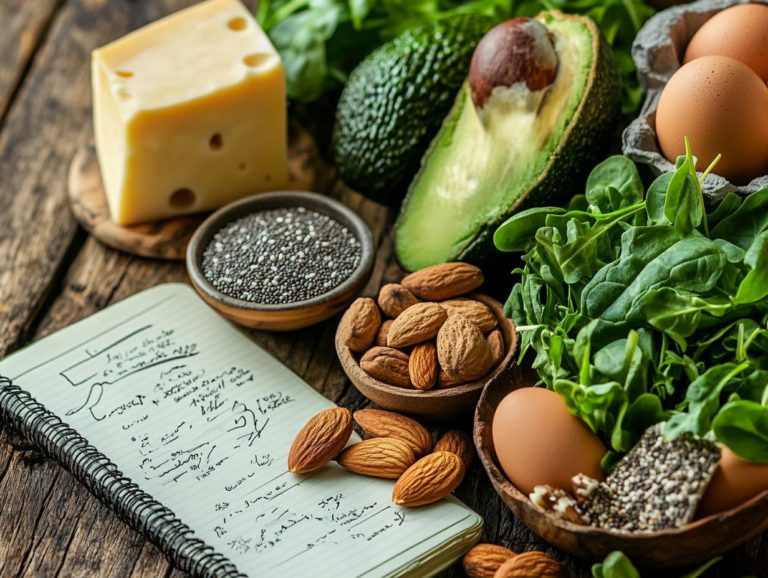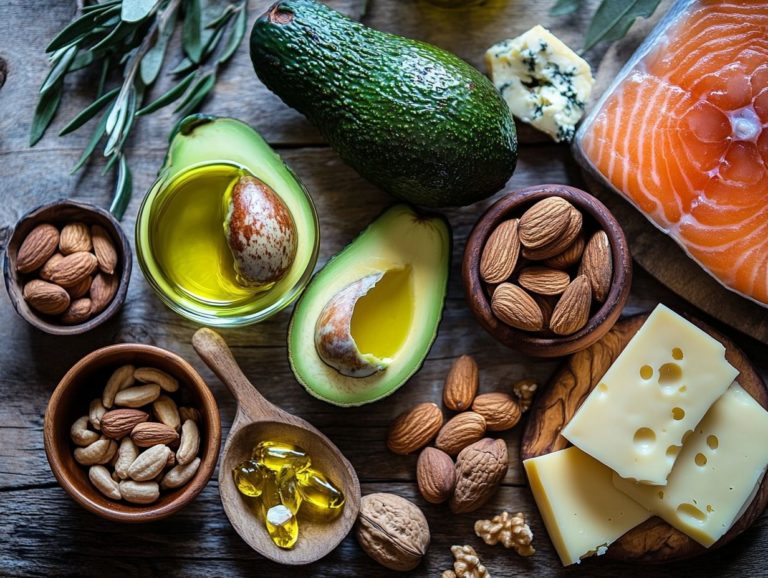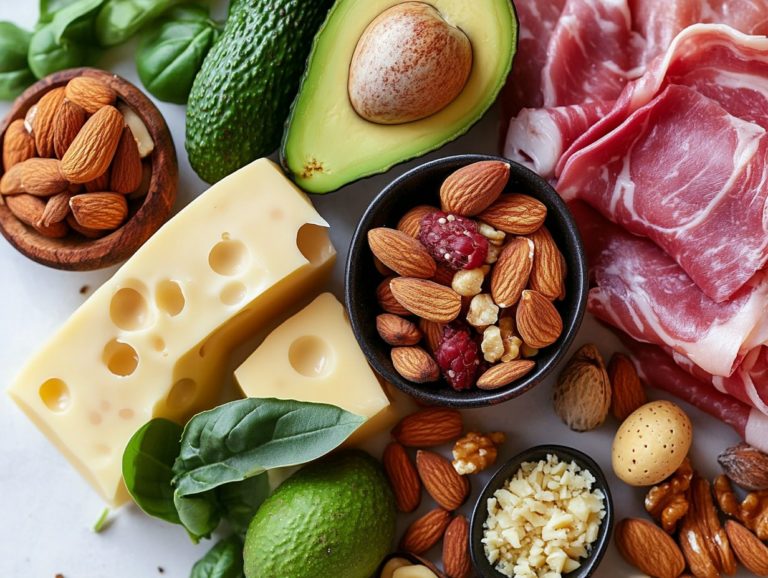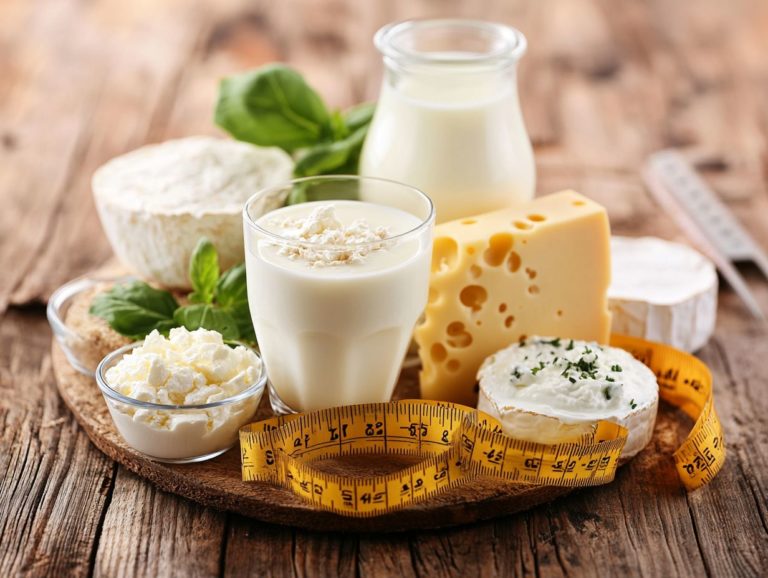The Role of Nutrients in Weight Loss on Keto
Contents
- The Keto Diet: Transform Your Nutrition
- Key Takeaways:
- What is the Keto Diet?
- How Does the Keto Diet Help with Weight Loss?
- What Nutrients are Important for Weight Loss on Keto?
- What Foods Should Be Avoided on a Keto Diet for Weight Loss?
- High-Carb Foods
- Processed Foods
- Sugary Drinks
- How Can Supplements Help with Weight Loss on Keto?
- Supplements for Your Ketogenic Diet
- 1. Multivitamins
- 2. Omega-3 Fatty Acids
- 3. Electrolyte Supplements
- 4. MCT Oil
- Frequently Asked Questions
- What is the role of nutrients in weight loss on Keto?
- How can the right balance of nutrients help with weight loss on Keto?
- What are some key nutrients to include in a Keto diet for weight loss?
- How do nutrients on Keto impact overall health and weight loss?
- Can consuming too many nutrients on Keto hinder weight loss?
- What is the best way to ensure adequate nutrient intake on Keto for weight loss?
The Keto Diet: Transform Your Nutrition
The Keto diet, a type of low-carbohydrate diet, has become a powerhouse in the realm of weight loss. It transforms your perspective on nutrition in remarkable ways.
By prioritizing high-fat, low-carbohydrate foods, this approach nudges your body into a fat-burning stage known as ketosis. In ketosis, your body begins to burn body fat for energy instead of relying on carbs. This process has significant health benefits for overall well-being.
Explore the essential nutrients that support weight loss on keto. Learn which foods to embrace and which to avoid, and discover how supplements, including ketogenic resources, can elevate your journey.
Immerse yourself in the secrets of effective weight management through the Keto methodology, supported by dietitian guidance!
Key Takeaways:
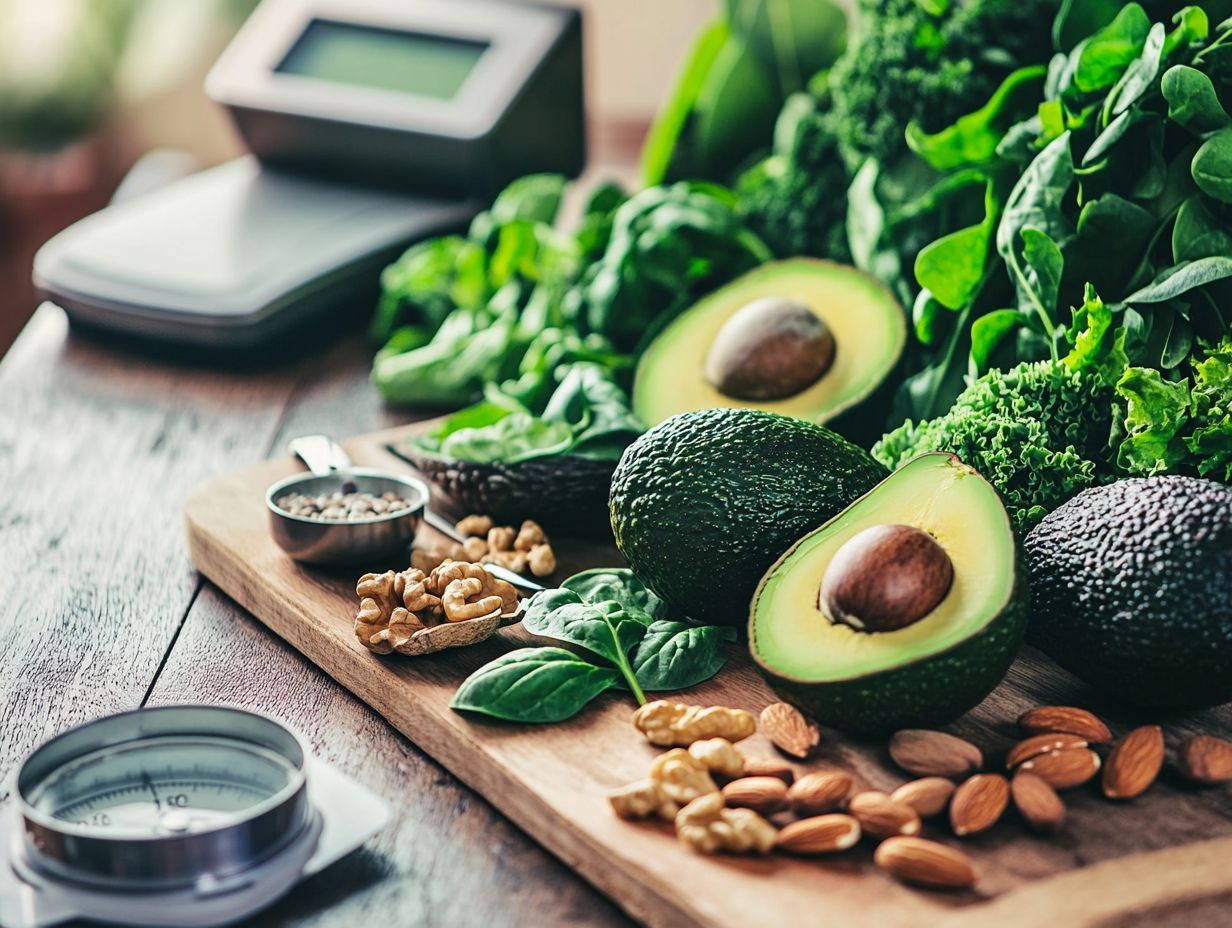
- The keto diet promotes weight loss by inducing a state of ketosis, burning fat for energy instead of glucose.
- Proper consumption of moderate protein, healthy fats, fiber, and electrolytes is crucial for weight loss on keto.
- Including non-starchy vegetables and lean proteins while avoiding high-carb foods and sugary drinks is essential for a successful keto diet.
What is the Keto Diet?
The ketogenic diet, commonly known as the keto diet, is a strategic low-carbohydrate, high-fat approach that changes your body s metabolism from relying on carbohydrates to utilizing fat as its primary energy source. This diet is often compared to other high-protein diets like the Atkins diet, Paleo diet, South Beach diet, and Dukan diet.
By dramatically cutting back on carbohydrate intake and substituting it with healthy fats, you can enter a fat-burning stage called ketosis. In this stage, your body becomes adept at burning stored fat for energy and produces ketone bodies as a beneficial byproduct.
This dietary method supports not only weight loss but also provides various health advantages. These include improved diabetes management and reduced risk of Alzheimer’s disease, significantly enhancing your overall well-being and metabolic health.
How Does the Keto Diet Help with Weight Loss?
The keto diet has emerged as a favored choice for those seeking effective weight loss solutions. This is largely due to its profound influence on insulin levels and fat metabolism.
By significantly cutting back on carbohydrate intake, you enable your body to enter a state of ketosis, wherein it begins to utilize stored body fat for energy. This dietary strategy is particularly beneficial for individuals managing diabetes or obesity.
This transition leads to a noticeable decrease in overall body fat percentage and plays a crucial role in regulating appetite hormones. As a result, you may experience fewer food cravings, making it simpler to maintain a caloric deficit and achieve your weight loss goals.
What is Ketosis and How Does it Affect Weight Loss and Health Parameters?
Ketosis is a fascinating metabolic process that unfolds when your body, running low on carbohydrates, begins to tap into fat as its primary energy source. In this state, your liver works diligently to convert fatty acids into ketone bodies, which serve as an alternative fuel for your brain and other tissues, effectively taking over from glucose.
This transition not only ramps up fat burning but also significantly aids in weight loss. Your body becomes adept at mobilizing stored fat while enhancing overall metabolic function. However, it is crucial to differentiate between nutritional ketosis and ketoacidosis, a dangerous condition often associated with diabetes.
As your glucose levels decrease, you ll notice a series of metabolic adaptations taking place. Initially, your body relies on glycogen stores, but as these reserves dwindle, the shift toward fat metabolism becomes more pronounced.
In this fascinating metabolic landscape, your body is not only burning stored fat for energy but also experiencing enhanced mental clarity and focus. Ketones are known to fuel the brain more efficiently than glucose. Some individuals also practice fasting periods to boost the effectiveness of ketosis.
Sustained energy levels become more evident, leading to a reduced need for frequent meals. These metabolic changes create an environment highly conducive to weight loss, making ketosis an appealing option for anyone seeking effective, long-term health benefits.
What Nutrients are Important for Weight Loss on Keto?
When you embark on a ketogenic diet, recognizing the essential nutrients for successful weight loss is paramount to maintaining your health and avoiding nutrient deficiencies.
Key nutrients that you should focus on include moderate protein, healthy fats, fiber, and electrolytes. These nutrients play a vital role in supporting how your body uses energy and enhancing your overall well-being.
Protein is crucial for keeping your muscles strong during weight loss, while healthy fats deliver sustained energy and promote feelings of fullness. This helps you effectively manage your appetite and curb those pesky food cravings.
However, ensure you balance your diet to avoid potential nutrient deficiencies and any adverse effects on health parameters.
1. Importance of Protein for Weight Loss
Protein is essential in your ketogenic diet, playing a pivotal role in preserving muscle and enhancing body composition as you embark on your weight loss journey. By ensuring you consume enough protein, you can effectively prevent muscle loss during the caloric deficit commonly associated with keto plans.
Regarding dietary guidelines, it s generally suggested that those following a keto regimen should aim for around 20-25% of their daily caloric intake from protein sources. This means incorporating high-quality proteins like lean meats, fish, eggs, dairy, and even plant-based options such as nuts and seeds.
These choices not only provide essential amino acids but also support vital metabolic functions. These protein sources are crucial for fostering lean muscle mass.
Choosing a diverse array of protein options ensures you get other important nutrients and enhances your overall health. This helps maintain well-rounded nutrition throughout your keto journey.
2. Healthy Fats
Healthy fats serve as the cornerstone of your ketogenic diet, providing the primary energy source that fuels your body during ketosis. By prioritizing these healthy fats, you can easily meet your caloric intake needs while promoting satiety and reducing those pesky food cravings.
Consider incorporating nutrient-dense options like avocados, nuts, and healthy oils, such as olive oil. These contribute significantly to your overall well-being.
Avocados, packed with monounsaturated fats, offer not only fiber and potassium but also support better heart health and sustained energy levels. Nuts deliver a perfect blend of omega-3 and omega-6 fatty acids, enhancing brain health and reducing inflammation.
Olive oil is renowned for its antioxidant properties and cardiovascular benefits, making it an excellent choice for your high-fat recipes. By incorporating these healthy fats, you make sure to pack in enough healthy fats to kickstart your ketosis and fuel your body!
3. Fiber

Fiber is a vital pillar of a well-rounded ketogenic diet, primarily derived from non-starchy vegetables and select low-carb fruits. Ensuring adequate fiber intake is essential for your digestive health, as it helps prevent constipation and supports overall gut well-being.
Incorporating a diverse array of fibrous foods does more than just aid digestion; it enhances your sense of fullness, making it easier to manage cravings and stay on track with your goals.
Leafy greens such as spinach and kale, along with cruciferous vegetables like broccoli and cauliflower, serve as excellent fiber sources that effortlessly integrate into your keto journey.
These vegetables offer not only the necessary roughage but also a wealth of essential vitamins and minerals that bolster your body’s functions. This helps avert nutrient deficiencies that can come from cutting back on carbohydrates.
By prioritizing fiber in your ketogenic diet, you can promote improved digestive health and maintain stable energy levels throughout the day. This ensures you feel your best while enjoying the benefits of your low-carb lifestyle.
Start incorporating these essential nutrients into your diet today for immediate benefits on your weight loss journey!
4. Electrolytes
Electrolytes are absolutely critical for maintaining your health, especially during the initial stages of the ketogenic diet when your body is experiencing rapid shifts in fluid balance and nutrient composition. Key electrolytes include sodium, potassium, and magnesium; they are your allies in preventing common nutrient deficiencies while supporting hydration and muscle function.
Ensure these are balanced to avoid ketoacidosis and other medical conditions. These essential minerals are important for controlling numerous bodily functions, from nerve transmission to muscle contractions and even maintaining a healthy acid-base balance.
As you transition to a keto lifestyle, you might notice increased water loss. This makes it all the more important for you to replenish these electrolytes through both your diet and supplements. Doing so will help maintain stable energy needs and avoid potential adverse effects.
Load up on these mineral-rich foods to supercharge your keto journey! Incorporating foods rich in these minerals such as avocados, leafy greens, nuts, and seeds into your keto menu can significantly enhance your nutritional profile.
Neglecting your electrolyte balance could lead to unwelcome issues like dehydration, fatigue, and muscle cramps, all of which can sap your energy levels and overall health. Choosing the right food varieties can minimize these risks.
Prioritizing your electrolyte intake is essential for thriving on a ketogenic diet. Consulting with healthcare professionals, such as those from the Cleveland Clinic, can provide additional guidance.
What Foods Should Be Included in a Keto Diet for Weight Loss?
Integrating a diverse array of foods into your ketogenic diet is crucial for maintaining a well-rounded nutrient intake while effectively promoting weight loss and managing risk factors associated with various health conditions.
Focus on key food categories such as low-carb vegetables, lean proteins, healthy fats with high-fat content, and an assortment of nuts and seeds.
These selections not only facilitate your body s transition into ketosis but also deliver the essential nutrients necessary for optimal health and well-being.
1. Low-Carb Vegetables
Incorporating low-carb vegetables is a key component in various ketogenic plans, including the Atkins, Paleo, and South Beach diets. Low-carb vegetables are truly the backbone of the ketogenic diet, providing essential nutrients without making a dent in your carbohydrate intake.
Picture spinach, kale, and broccoli these veggie powerhouses are loaded with vitamins, minerals, and fiber, making them perfect for maintaining a balanced low-carbohydrate diet.
By incorporating these veggies into your daily meals, you not only prevent nutrient deficiencies but also play a vital role in supporting your digestive health. Take spinach, for example; it’s an outstanding source of iron and magnesium.
Then there’s broccoli, brimming with antioxidants and fiber that can enhance gut health and maintain regularity. To maximize their benefits, aim for about one to two cups of these low-carb delights per meal.
Opt for preparation methods like steaming or saut ing them in healthy fats, such as olive oil or butter, to elevate their flavors and improve nutritional absorption. This way, you ll ensure that your keto journey is both diverse and nutritious.
Start including these incredible foods in your meals today for a successful keto journey!
2. Lean Proteins
Lean proteins are essential for anyone embarking on a keto diet, serving as the backbone for muscle preservation while supporting weight loss and enhancing overall body composition. Options like chicken, turkey, and fish deliver high-quality protein without the burden of excess saturated fat, making them superb choices for a nutritious ketogenic meal plan.
Incorporating lean proteins into your meals not only helps fuel your body but also promotes the conversion of amino acids into energy, a particularly advantageous process during caloric deficits. This conversion is vital for maintaining muscle mass, an important aspect of long-term health and vitality.
If you’re following a ketogenic lifestyle, you can relish meals that include:
- Grilled chicken salads
- Turkey-stuffed bell peppers
- Baked salmon
These dishes provide the necessary nutrients while keeping your carbohydrate intake in check. Plus, these protein sources are packed with essential vitamins and minerals, further elevating your overall nutrition.
By thoughtfully integrating a diverse range of lean proteins into your diet, you can sustain your energy levels while diligently pursuing your weight loss goals, making the keto lifestyle both rewarding and effective.
3. Healthy Fats
In a ketogenic diet, you ll find that healthy fats take center stage as the primary macronutrient and energy source, crucial for maintaining that coveted state of ketosis. Think avocados, olive oil, and nuts these fantastic sources of healthy fats not only provide you with energy but also deliver essential nutrients while keeping you feeling satisfied.
By incorporating a diverse array of fats, like coconut oil, grass-fed butter, and fatty fish, you can take advantage of the unique benefits each one offers. For instance, the saturated fats in coconut oil can give your metabolism a little boost, while the omega-3 fatty acids found in fatty fish are essential for maintaining heart and brain health.
Focusing on these healthy fats makes it much easier to meet your caloric needs without turning to unhealthy alternatives, thereby supporting your overall well-being. This variety is key to ensuring you achieve a balance of essential fatty acids, which can help reduce inflammation and improve nutrient absorption, ultimately promoting a sustainable and health-conscious approach to your ketogenic lifestyle.
4. Nuts and Seeds
Nuts and seeds are exceptional additions to your ketogenic diet, offering a delightful blend of healthy fats, protein, and essential nutrients that can effectively support your weight loss journey. Varieties such as almonds, walnuts, and chia seeds are not only low in carbohydrates but also abundant in fiber and beneficial micronutrients.
These delectable foods are pivotal in promoting satiety, allowing you to feel fuller for longer and reducing the temptation for unhealthy snacks. By incorporating nutrient-dense options like Brazil nuts, known for their high selenium content, or pumpkin seeds, which are rich in magnesium, you can further elevate the nutritional profile of your diet.
Their impressive composition of healthy fats and proteins not only helps sustain your energy levels but also plays a role in preventing potential nutrient deficiencies that often accompany low-carb lifestyles. Embracing nuts and seeds fosters a balanced approach to your keto diet, ensuring that essential vitamins and minerals are always within reach.
What Foods Should Be Avoided on a Keto Diet for Weight Loss?

To achieve optimal weight loss results on a ketogenic diet, you must be vigilant about avoiding certain foods that can impede your progress. High-carb foods, processed items, and sugary drinks are particularly detrimental.
These can trigger spikes in insulin levels, making it challenging for your body to enter or sustain ketosis, which may ultimately lead to weight regain. Prioritizing the right choices will enhance your journey and help you maintain your desired results.
High-Carb Foods
High-carb foods, like bread, pasta, and sugary snacks, should be off your menu on a ketogenic diet. These items can disrupt the ketosis process and throw a wrench in your weight loss efforts.
When you indulge in these foods, they can deplete your glucose levels, prompting your body to revert to burning carbohydrates for energy instead of tapping into that stored fat.
Not only do these carbs send your insulin levels skyrocketing, but they also send your energy on a wild rollercoaster ride, making it difficult to stay motivated on your journey to a healthier lifestyle. Instead of reaching for those processed carbs, turn your attention to low-carb alternatives such as vibrant leafy greens, healthy fats, and high-quality proteins.
These choices can provide you with sustained energy and support your fat-burning goals. Keeping track of your carbohydrate intake is essential; even those seemingly innocent foods can harbor hidden sugars that could derail your progress.
By embracing healthier options and ensuring you’re consuming enough fats, you can effectively encourage your body to remain in ketosis and optimize your weight loss journey.
Processed Foods
Processed foods often contain unhealthy additives, refined sugars, and undesirable fats, posing a serious threat to your success on a ketogenic diet. Indulging in these items can lead to nutrient deficiencies and undermine your weight loss efforts.
These foods tend to increase caloric intake while failing to deliver essential nutrients. Consider the many forms of processed foods frozen meals, snack chips, sugary cereals that can easily divert you from your health goals by packing in empty calories and harmful ingredients.
They can cause insulin spikes and ignite cravings, making it all the more difficult to adhere to your dietary commitments. Embrace whole-food alternatives like avocados, leafy greens, and grass-fed meats to offer vital nutrients, promote a sense of fullness, and effectively support ketosis.
By prioritizing nutrient-rich, minimally processed options, you can savor delicious meals while enhancing your wellness journey, steering clear of the common pitfalls that accompany processed food consumption.
Sugary Drinks
Avoid sugary drinks such as sodas, sweetened coffees, and energy drinks due to their high sugar content and detrimental effects on your weight loss efforts. These beverages can trigger spikes in insulin levels, disrupting ketosis and promoting fat storage rather than fat burning.
When insulin levels surge, your body is signaled to store fat instead of using it as an energy source, making weight loss considerably more challenging. This is particularly important for those dedicated to a ketogenic lifestyle, as the aim is to sustain a state of ketosis where your body efficiently burns fat for fuel.
Instead of reaching for sugary drinks, consider healthier alternatives like sparkling water, herbal tea, or black coffee. These options not only keep your calorie counts low but also align perfectly with ketogenic principles.
Take control of your insulin levels now to boost your weight loss journey!
How Can Supplements Help with Weight Loss on Keto?
Supplements can significantly enhance your weight loss efforts on the ketogenic diet, especially if you find it challenging to meet your nutritional needs through food alone. They can help manage risk factors and ensure optimal nutrient absorption.
Important supplements, including multivitamins, omega-3 fatty acids, electrolyte supplements, and medium-chain triglyceride (MCT) oil, can effectively bridge nutritional gaps and promote your overall health.
By thoughtfully incorporating these into your regimen, you can optimize your keto journey and support your body in achieving its goals, similar to other low-carb diets like the Atkins diet, Paleo diet, South Beach diet, and Dukan diet.
Supplements for Your Ketogenic Diet
1. Multivitamins
Multivitamins can be a valuable addition to your ketogenic diet. They help address potential nutrient deficiencies that may arise from cutting back on carbohydrates.
By supplying essential vitamins and minerals, multivitamins support your overall health and well-being. This ensures your body has the necessary nutrients to function at its best.
A ketogenic lifestyle can limit your intake of certain food groups. This may lead to nutrient deficiencies.
Key vitamins, such as B-complex and vitamin D, along with nutrients like magnesium and potassium, are vital for energy production and muscle function especially for those embracing a low-carb approach.
You might be concerned about keeping your electrolyte levels balanced. Choosing high-quality multivitamins specifically designed for keto enthusiasts is essential.
This not only helps fill those nutrient gaps but also supports your overall vitality on this unique dietary journey. Don t miss out on these essential supplements!
2. Omega-3 Fatty Acids
Omega-3 fatty acids are essential fats that play a pivotal role in supporting your heart health and reducing inflammation. They are invaluable for anyone following a ketogenic diet.
By incorporating these healthy fats, you can help balance your intake of omega-6 fatty acids and elevate the overall fat profile of your diet.
Integrating omega-3s into your daily regimen enhances your cardiovascular health and helps reduce the risks associated with chronic inflammation.
Key sources of omega-3 fatty acids include sumptuous fatty fish like salmon, mackerel, and sardines, which provide generous doses in a delightfully tasty form.
If you prefer plant-based options, flaxseeds or walnuts can serve as excellent alternatives for those embracing a vegetarian or vegan ketogenic lifestyle. Consider omega-3 supplementation in the form of fish oil or algal oil to fit seamlessly into your healthy fat intake.
By prioritizing these nutrient-dense sources, you can bolster your heart health and enhance your overall well-being while staying true to the principles of the keto diet. Start incorporating omega-3s today!
3. Electrolyte Supplements
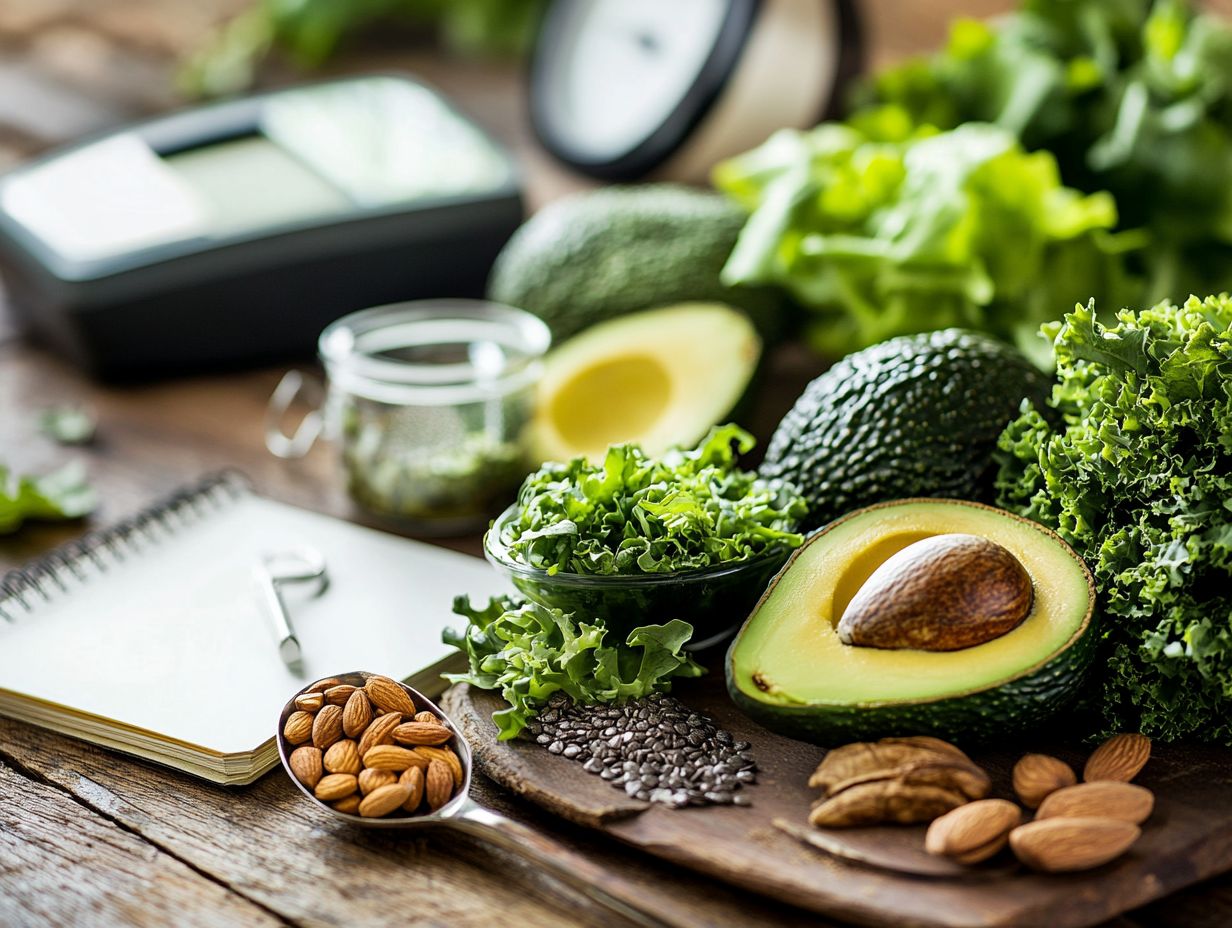
Electrolyte supplements can be especially advantageous as you embark on a ketogenic diet. They help you maintain optimal hydration and avoid nutrient deficiencies that often accompany fluid loss.
Key nutrients like sodium, potassium, and magnesium are vital for your health and well-being.
As you transition into the initial phases of a keto diet, your body undergoes considerable changes. These changes can lead to an imbalance of essential minerals.
Switching from burning carbohydrates to fats for energy may cause increased urination, resulting in the loss of critical minerals that support nerve function, muscle contractions, and hydration.
Incorporating electrolyte supplements into your routine can help alleviate symptoms often referred to as the ‘keto flu’, such as fatigue, headaches, and cramps.
For those starting this dietary journey, it s wise to monitor your electrolyte levels closely. Consider using supplements or consuming electrolyte-rich foods to enhance hydration and support optimal health during this transition. Keep your electrolytes in check for a smoother keto experience!
4. MCT Oil
MCT oil, a type of fat that is easily absorbed by the body, is derived from medium-chain triglycerides. This oil stands out as a favored supplement in the ketogenic diet, offering you a rapid source of energy while supporting your weight loss journey. Its swift absorption into the bloodstream allows your body to utilize MCTs for fuel, promoting ketosis and enhancing fat burning.
This remarkable oil not only provides a convenient energy boost but also enhances cognitive function, sharpening your mental clarity and focus. If you re looking to weave MCT oil into your daily meals, it s a breeze to incorporate. Toss it into smoothies, drizzle it over salad dressings, or mix it into your coffee to elevate your nutrient intake without overwhelming your taste buds.
By increasing your MCT oil usage, you’ll effectively raise your fat consumption, a boon for anyone following a low-carb diet. As you explore the benefits of this versatile oil, you’ll find it a powerful ally in your wellness routine, seamlessly supporting your various health goals. Start using MCT oil today and feel the difference in your energy levels!
Frequently Asked Questions
In this section, we address common questions regarding the role of nutrients in weight loss on a ketogenic diet.
What is the role of nutrients in weight loss on Keto?
The role of nutrients on Keto is crucial in achieving weight loss goals. Nutrients provide the body with energy and support metabolic processes.
How can the right balance of nutrients help with weight loss on Keto?
The right balance of nutrients, specifically protein, fat, and carbohydrates, helps promote weight loss on Keto. By consuming a higher ratio of fat and protein while limiting carbs, the body enters a state of ketosis, resulting in weight loss.
What are some key nutrients to include in a Keto diet for weight loss?
Key nutrients to include in a Keto diet for weight loss are healthy fats such as avocados and coconut oil, high-quality proteins like grass-fed beef and wild-caught fish, and low-carb vegetables like leafy greens and cruciferous vegetables. It’s also important to consider macronutrients, which are nutrients that provide calories or energy, to maintain a balanced diet.
How do nutrients on Keto impact overall health and weight loss?
Nutrients on Keto also improve overall health. A diet rich in healthy fats and proteins can help lower inflammation, improve heart health, and regulate blood sugar levels.
Can consuming too many nutrients on Keto hinder weight loss?
Yes, consuming too many nutrients can hinder weight loss. It s important to maintain a proper balance and not overconsume these nutrients, as they still contain calories and can prevent the body from entering a state of ketosis.
What is the best way to ensure adequate nutrient intake on Keto for weight loss?
The best way to ensure adequate nutrient intake on Keto for weight loss is to incorporate a variety of whole, unprocessed foods into your diet. This includes healthy fats, proteins, and low-carb vegetables, as well as supplementation if necessary.


